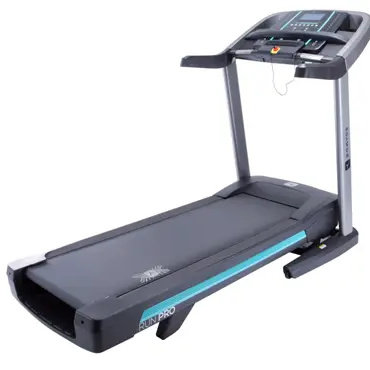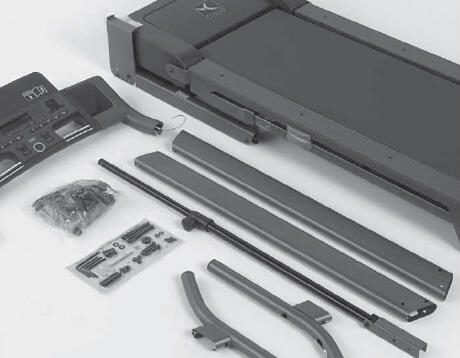Composition / advice
COMPOSITION:
Running deck:
40% Copper,
35% Steel,
10% Brass,
10% Epoxy,
5% Aluminium
Frame // Chassis (for the rollers):
80% Steel,
20% Polystyrene (PS)
USE RESTRICTIONS:
Max. user weight: 150 kg.

REF: 8350242
2017
Year sold: 2016
Designed for running at home or at a small club
BENEFITS:
VERSATILITY: Maximum speed: 22 km/h, motorised incline: 0 to 12%
USER COMFORT: Running surface: 51x150 cm
COACHING: 20 programmes, 5 functions: time, speed, distance, calories, BPM

COMPOSITION:
Running deck:
40% Copper,
35% Steel,
10% Brass,
10% Epoxy,
5% Aluminium
Frame // Chassis (for the rollers):
80% Steel,
20% Polystyrene (PS)
USE RESTRICTIONS:
Max. user weight: 150 kg.
Is your equipment properly set up but you're still having an issue when using it? See all our FAQs here.
Running belt tension is too high:
=> Check the running belt tension so that the movement of the belt between the deck and belt is about 3 centimetres at the middle of the deck.
=> If this is not the case, turn the two hex screws at the rear of the treadmill on each side of the roller and then loosen the running belt.
If the treadmill did not have enough time to calibrate the incline:
=> Turn the treadmill off, turn it back on and insert the safety key
=> Let it run through the full calibration cycle. The treadmill will raise up to its maximum incline before coming back down to zero. This process can take several minutes.
To force the treadmill calibration:
1.Press Stop and Speed + at the same time
2. Insert the safety key while continuing to press the buttons
3. Press Stop once and the screen information will appear
4. Press incline+ to launch the calibration.
Poor treadmill connection:
=> Check that the treadmill is plugged into the mains and that the main switch is set to "1"
=> Check that the safety key has been inserted
=> Check the circuit interrupter reset button and press it if it has cut off power.
The screws are loose:
=> Tighten all of the screws.
The running belt is wonky:
=> Select the "Centring the running belt" tab in the MAINTENANCE section.
The running belt is not lubricated:
=> Select the "Lubricating the running belt" tab in the MAINTENANCE section.
The treadmill belt is slack:
=> Select the "Running belt tension" tab from the MAINTENANCE section.

PLEASE CONTACT OUR TECHNICIANS.
Care and maintenance are important for the longevity of your equipment. Please find further maintenance instructions here.
1. Locate the coloured indicators at the back of your treadmill. If they appear red, the band needs to be re-centred. This will enable you to protect the running belt and prevent the machine from stopping when you aren't expecting it to.
2. Turn your treadmill to 4 km/h (2.5 mph) and stand at the back of the machine.
3. If the belt has shifted towards the left: Turn the left adjustment screw through half a rotation, in a clockwise direction.
4. If the belt has shifted towards the right: Turn the right adjustment screw through half a rotation, in a clockwise direction.
5. Leave your treadmill running for the time it takes for the belt to move across (1 to 2 minutes) and repeat the operation if necessary.
Make sure, however, that you do not over-stretch the belt.
The running belt will be subjected to wear and tear and become less taut over time. Be sure to tighten it as soon as it starts to slip (a skidding sensation, with jerky changes of speed).
1&2. Turn the 2 adjustment screws through half a rotation, in a clockwise direction. Repeat this step if necessary but make sure you don't over-stretch the belt.
3. The belt is correctly stretched if you can lift the edges 3 to 5 cm on each side.
It is imperative that you keep your treadmill well-lubricated, so as to limit the amount of friction between the running belt and the deck. No lubrication is necessary if traces of silicone are present on the inner side of the running belt or on the deck (and the surface is damp and slightly greasy).
If the belt and the deck are dry:
1. Switch off your treadmill and unplug it.
2. Lift up the sides of the running belt and coat the inner surface with silicone.*
3. Plug your treadmill in again.
4. Make the belt rotate at a speed of 4 km/h (2.5 mph), with no-one on it, for 10 to 20 seconds.
5. Your treadmill is ready for use!
* A single lubrication corresponds to a dose of between 5 and 10 ml of silicone.
Please note that if you use too much silicone, you could harm the proper functioning of your treadmill (risk of skidding).
When buying lubricants, consult your local DECATHLON store or go to www.domyos.com.
Regular maintenance is necessary to maintain the performance of the machine and to extend the life of the product.
The following can help reduce treadmill noise:
1. Tighten the screws and bolts once a month.
2. Lubricate the running belt after 200 hours of use.
3. Place a suitable floor mat (such as the Domyos Training Mat) under your treadmill.
Cleaning:
1. Switch off and then unplug the treadmill.
2. Apply a small amound of mild, multi-purpose cleaner, using a 100% cotton cloth. Do not spray directly onto the walking belt and do not use acid or ammonia-based cleaning products.
3. Wipe the console and screens.
4. Remove any dust and grime from the hand rails, uprights, foot rails, frame and motor hood. In addition, wipe the deck along the sides of the walking belt. Do not wipe under the walking belt.
NEED SPARE PARTS FOR YOUR RUN PRO TREADMILL?

Need the product's user guide? Click to download.

DOMYOS guarantees this product under normal use conditions, 5 years for the structure, 2 for other parts and labour as from date of purchase, as shown on receipt.